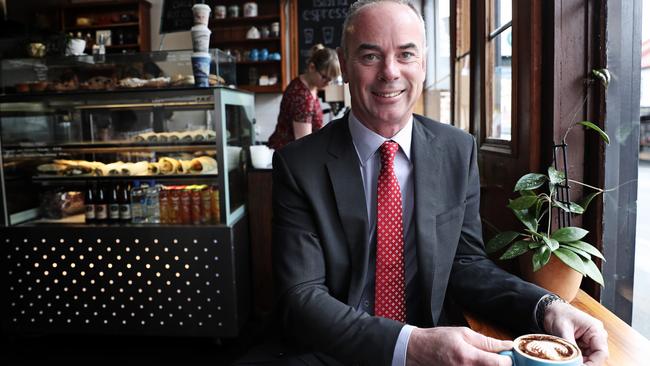Cafe Society: The housing debt we don’t need
Keep negative gearing in place but release Tassie from its historic housing debt, says real estate leader ADRIAN KELLY

Tasmania
Don't miss out on the headlines from Tasmania. Followed categories will be added to My News.
WHEN he’s walking around Hobart Adrian Kelly often feels a tingle of joy.
“Hobart was so dark and dreary, but look at it now,” says the national president of the Real Estate Institute of Australia, who co-owns Tasmania’s View agency.
“I was born and bred here and I can’t believe the change in this place, not just the buildings but the happiness in people as you walk down the street.”
A trusty sign of a city going places is a proliferation of new cafes, he says, and there’s plenty of them around central Hobart. Today Adrian has chosen an oldie but a goodie, Midtown’s Island Espresso, which has been run by the same family for 20 years.
Coincidentally, my focus this week is on this same stretch of Elizabeth St, with its student accommodation, for a story on the University of Tasmania’s wholesale move into the city over the next decade or so. What’s his take on a city-centric campus?
“I’m OK with it,” he says. “I would rather see nice things being built than carparks.”
He is keen to see the Northern Suburbs Rail Project alive and chugging, too.
“From a real estate point of view, it would allow for so much development along that corridor and out into the northern suburbs.”
State and federal governments need to come up with the cash to activate it, though. The private sector is already driving the state’s prosperity.
MORE CAFE SOCIETY
HOBART NEEDS TO SPEAK WITH ONE VOICE
FINDING SOLUTIONS TO TASMANIA’S TOURISM CONUNDRUM
I’LL BUILD THE FERRIES, SAYS CLIFFORD
DERWENT FACING A WATERSHED MOMENT
BOLD SOLUTIONS TO STATE’S HOUSING CRISIS
LEARNING TO SPEAK IN CONFIDENCE
ALL WELCOME TO HELP BUILD BRIDGES
“If you look at all the things happening in Hobart, it’s largely driven by private enterprise.
New hotels, shopping centres, people renovating homes, shops and other commercial premises, small-scale apartment blocks — none of that is driven by government, and nor should it be, but government should do everything it can to stay out of the way and assist where possible. It needs to provide critical infrastructure.”
Our meeting coincides with the release of an Anglicare report showing that affordable rental housing is at a record low, with a troubling combination of rising private rental costs, house prices, a reduction in private rental listings and a shortfall of public housing locking some of Tasmania’s most vulnerable out of secure homes.
Though he is a beneficiary of the current property boom, Adrian says it’s worrying to see the pain of housing affordability “lumped in with all this success”. “I am incredibly excited by what we are experiencing at the moment and think it is just the tip of the iceberg, the beginning of real prosperity and job creation for Tasmania. But I hold big fears for those who aren’t a part of that.”
He says potentially slowing the investment property market with changes to negative gearing tax arrangements, as proposed by federal Labor, is a risky move.
“It would mean even fewer available rental properties,” he says. “With fewer rental properties, rents go up.”
Ahead of the May 18 federal election, the Real Estate Institute is running a national campaign on retaining negative gearing, which has been in effect for decades.
What would make a big difference to affordable housing in Tasmania is the Commonwealth forgiving the state its public housing debt incurred decades ago, freeing up funding for new builds.
“They forgave the debt in South Australia, so why not Tasmania?” Adrian asks.
The loan costs the state about $15 million a year in interest payments, swallowing a large chunk of the Commonwealth’s annual housing assistance.
“The Federal Government has so much cash and it burns a lot of it by making mistakes and spending it on projects it shouldn’t spend it on,” he says.
“And that’s because it’s not their money … that housing debt hits our back pocket, though.”
Adrian is also calling for an end to stamp duty, which hits buyers right when they are making what is often the biggest financial commitment of their lives.
He says the impost was supposed to be ditched when the GST was introduced.
He joins leading economist and fellow Tasmanian Saul Eslake in calling for serious consideration to be given instead to the introduction of a low-rate, broad-based property tax.
It’s a smaller issue, but it’s time we had a conversation about residential lease lengths, too, he says, both to provide longer-term security for tenants and a no-fuss option for rental property owners.
“Why not a two or five-year lease where appropriate?” he asks, instead of the usual six or 12 month standards.
As for yesterday’s news that the median price for a home in Tasmania has dipped for the first time in years?
“I am pretty relaxed about it in the sense it’s only a single quarter,” he says. “I think that’s still OK, as we all knew we couldn’t sustain the frenzy indefinitely. The market still seems pretty settled to me. There’s still plenty of demand.
“When I got into real estate in the early ’90s, it took six to nine months to sell a house. Today it’s a matter of weeks.”


